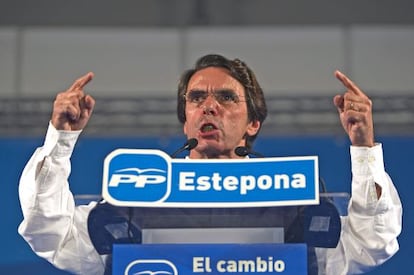Popular Party paid former PM Aznar bonuses as entertainment allowances
Monthly payments also made to other top PP officials were subject to tax

Former Prime Minister José María Aznar and a large number of other top officials in the ruling Popular Party were paid monthly “bonuses” prior to the PP’s election victory in the general elections in 1996. The PP entered these payments in its official accounts as “entertainment allowances.”
According to the PP’s official accounts, to which EL PAÍS has had access, in addition to his monthly salary of 400,000 pesetas (about 2,400 euros) as a deputy, Aznar also received monthly payments of 500,000 pesetas (3,000 euros) from the PP, with additional payments in July and September.
The High Court is now examining the documents submitted by the party and cross-checking these accounts with information contained in secret ledgers kept by the PP’s former treasurer, Luis Bárcenas, which indicate cash payments to top PP officials and illegal donations from companies and individuals.
In 1990, the PP paid Aznar seven million pesetas (42,000 euros), a figure that was increased by 14 percent the following year. Bárcenas, who has been implicated in the Gürtel kickbacks-for-contracts case and at one point had over 30 million euros in Swiss bank accounts, told an investigating judge in February that these payments were a form of “bonuses” that were taxed at 21 percent and approved on legal advice.
The PP and the Aznar’s office declined to comment on the information obtained by EL PAÍS.
The practice of extra payments to party officials is common within the political grouping. Prime Minister Mariano Rajoy declared that his income rose between 2007 and 2011 by 27 percent as a result of the increase in sums given to him by the party. He included these sums as entertainment allowances in his tax declarations.
Bárcenas told the anti-corruption prosecutor’s office on February 6: “Bonuses? Of course. In the case of a national deputy or a national senator with parliamentary responsibility, as within any company, it is taken that he has a higher level of responsibility and puts more hours in.”
Bárcenas said he consulted with a law firm about making these extra payments to deputies. “They told us there was no problem,” the former party treasurer told the judge. “The payments were reflected in receipts that showed the sums involved were gross sums. The withholding tax that was normally imposed was the same as that in Congress and the Senate, which was 21 percent,” Bárcenas said.
If Aznar had declared the money he received as income from labor, the withholding tax that would have applied would most likely have been different. “It’s difficult to calculate. Depending on personal circumstances, it would be on average around 30 percent, with a maximum rate of 56 percent,” one expert told EL PAÍS.
In 1993, the treatment of such payments to party officials and employees becomes more diffuse, with a large part of the PP’s top management receiving payments. The official accounts for that year show only one payment for the amount of 1.793 million pesetas (10,800 euros) being made to Aznar on January 18.
Tu suscripción se está usando en otro dispositivo
¿Quieres añadir otro usuario a tu suscripción?
Si continúas leyendo en este dispositivo, no se podrá leer en el otro.
FlechaTu suscripción se está usando en otro dispositivo y solo puedes acceder a EL PAÍS desde un dispositivo a la vez.
Si quieres compartir tu cuenta, cambia tu suscripción a la modalidad Premium, así podrás añadir otro usuario. Cada uno accederá con su propia cuenta de email, lo que os permitirá personalizar vuestra experiencia en EL PAÍS.
¿Tienes una suscripción de empresa? Accede aquí para contratar más cuentas.
En el caso de no saber quién está usando tu cuenta, te recomendamos cambiar tu contraseña aquí.
Si decides continuar compartiendo tu cuenta, este mensaje se mostrará en tu dispositivo y en el de la otra persona que está usando tu cuenta de forma indefinida, afectando a tu experiencia de lectura. Puedes consultar aquí los términos y condiciones de la suscripción digital.








































